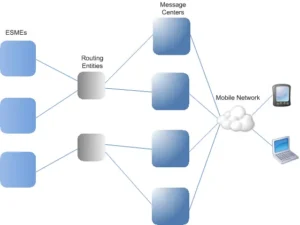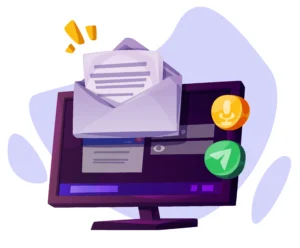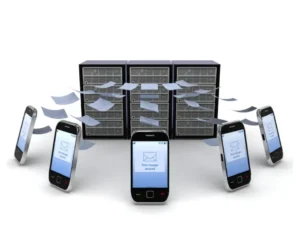SMS gateways have emerged as an efficient and widely-used communication tool amongst businesses. By enabling streamlined communication with stakeholders, businesses have found SMS gateways valuable in facilitating effective communication channels. In this article, we will delve deeper into the benefits of SMS gateways as a communication tool to enhance business communication processes. It is noteworthy that SMS gateways provide a reliable and quick communication solution that enables businesses to reach out to stakeholders instantly.
This article explains how businesses can leverage SMS gateways to enhance communication and create long-lasting customer relationships.
Table of Contents
What is an SMS Gateway and its functionality?
An SMS gateway is a technology platform that enables the sending and receiving of Short Message Service (SMS) messages between mobile devices and other systems, such as computers or applications. It acts as a bridge between different communication networks, converting messages from one protocol to another to ensure seamless transmission.
Typically, businesses and organizations use SMS gateways to send bulk SMS messages to a large number of recipients simultaneously. These messages can be promotional offers, transactional notifications, alerts, reminders, or any other type of communication.
SMS gateways are usually provided by telecommunication companies or specialized service providers, and they often offer various features like message scheduling, delivery reports, and integration with other software or systems.
To send an SMS through an SMS gateway, businesses can use web-based interfaces, APIs (Application Programming Interfaces), or even integrate the gateway into their existing software applications to automate messaging processes. It has become a vital tool for businesses to engage with their customers, as it offers a fast, reliable, and cost-effective way to communicate directly with a wide audience.
Primary use cases of SMS Gateways in a business context.
Transactional SMS
A transactional SMS is a type of short message service (SMS) that businesses use to send critical and time-sensitive information to their customers. Unlike promotional SMS, which is used for marketing purposes and often contains offers or advertisements, transactional SMS focuses on providing relevant transaction-related information.
Transactional SMS messages are typically used to send important updates, notifications, or alerts triggered by specific actions or transactions. Some common examples of transactional SMS messages include:
Order and purchase confirmations: Sending customers an SMS to confirm their order and purchase details, including order numbers, payment information, and delivery status.
Account updates: Notifying customers about changes to their account information, such as password resets, account balance updates, or login alerts.
Appointment reminders: Sending reminders to clients about upcoming appointments, bookings, or reservations.
One-time passwords (OTP): Providing secure authentication by sending OTPs for online transactions or login verifications.
Shipping and delivery updates: Informing customers about the status of their shipment, including tracking details and delivery estimates.
Transactional SMS messages are typically delivered instantly and have high priority, ensuring that customers receive crucial information promptly. These messages are considered essential for maintaining a positive customer experience, ensuring transparency, and building trust between businesses and their customers. Due to their importance, transactional SMS messages are often exempt from “Do Not Disturb” (DND) regulations and can be sent to both DND and non-DND registered mobile numbers.
Promotional SMS
Promotional SMS is a type of short message service (SMS) that businesses use for marketing and promotional purposes. Unlike transactional SMS, which focuses on delivering critical and time-sensitive information, promotional SMS aims to promote products, services, offers, discounts, events, or any other marketing content to a targeted audience.
Businesses use promotional SMS to engage with existing and potential customers, increase brand visibility, drive sales, and create awareness about their offerings. These messages often contain promotional content, such as:
Special offers and discounts: Informing customers about limited-time discounts, seasonal sales, or exclusive deals.
Product launches: Announcing the release of new products or services and highlighting their features.
Event invitations: Sending invitations and reminders for events, conferences, webinars, or promotional activities.
Marketing campaigns: Sharing links to landing pages or websites where customers can learn more or take advantage of the promotions.
Surveys and feedback requests: Seeking customer feedback and opinions to improve products and services.
Promotional SMS campaigns are carefully targeted to reach the intended audience, ensuring that the messages are relevant and valuable to the recipients. However, it is essential for businesses to comply with local regulations and obtain consent from recipients before sending promotional SMS messages. Additionally, these messages may be subject to “Do Not Disturb” (DND) restrictions, and businesses need to ensure compliance with such guidelines to avoid potential penalties or legal issues.
Why is it important to have an SMS gateway for business?
Having an SMS gateway is essential for businesses for several crucial reasons:
Effective Communication: An SMS gateway allows businesses to communicate directly and effectively with their customers. SMS has a high open and read rate, ensuring that important messages and updates reach recipients promptly.
Customer Engagement: SMS provides a personalized way to engage with customers. Businesses can send relevant offers, promotions, and updates, fostering customer loyalty and encouraging repeat business.
Instant Delivery: SMS messages are delivered instantly, making it ideal for time-sensitive information, such as order confirmations, appointment reminders, or event notifications.
Cost-Effectiveness: Compared to traditional marketing methods, SMS marketing is cost-effective. It offers a higher return on investment (ROI) and allows businesses with limited budgets to reach a broader audience.
High Reachability: SMS works on virtually all mobile devices, ensuring that businesses can connect with a wide range of customers, even those without internet access or smartphones.
Automation and Integration: SMS gateways can be integrated into existing business systems and software, allowing for automated and streamlined communication processes.
Opt-In and Opt-Out Options: With SMS, customers have the option to opt-in or opt-out of receiving messages, ensuring compliance with privacy regulations and building trust with the audience.
Transactional Support: SMS gateways enable businesses to send transactional messages, such as order confirmations and OTPs, enhancing customer experience and providing vital information promptly.
Improved Customer Service: SMS can be used for customer support, enabling businesses to address queries and concerns quickly, leading to higher customer satisfaction.
Mobile Marketing Dominance: As mobile usage continues to rise, businesses must adapt to the mobile-first landscape. An SMS gateway becomes an integral part of a comprehensive mobile marketing strategy.
Use Cases of SMS API
Two-Factor Authentication (2FA): SMS API is widely used for implementing 2FA mechanisms, adding an extra layer of security to user accounts. By sending OTPs or verification codes via SMS, businesses can ensure secure access to their platforms or services.
Appointment Reminders: Healthcare providers, salons, and other service-based businesses utilize SMS API to send appointment reminders to clients. This helps reduce no-shows and ensures optimal utilization of resources.
Marketing Campaigns: SMS remains a powerful tool for marketing campaigns, with high open and response rates. Businesses leverage SMS API to send promotional messages, discount offers, or product updates directly to customers’ mobile phones.
Transaction Alerts: Banks and financial institutions utilize SMS API to send real-time transaction alerts to customers, notifying them of activities such as ATM withdrawals, online purchases, or account balances.
Delivery Notifications: E-commerce companies leverage SMS API to keep customers informed about the status of their orders, from order confirmation to shipment tracking and delivery updates.
Emergency Alerts: Governments, municipalities, and disaster management agencies utilize SMS API to broadcast emergency alerts and evacuation notices to residents during natural disasters or other emergencies.
In conclusion, SMS Gateway and SMS API play a pivotal role in modern communication strategies, offering a plethora of benefits and diverse use cases for businesses across various industries. From enhancing customer engagement to facilitating secure transactions and real-time notifications, the versatility and reliability of SMS make it an indispensable tool in today’s digital landscape. By harnessing the power of SMS Gateway and API, businesses can unlock new avenues for efficient and impactful communication, driving growth, and fostering stronger connections with their customers.


